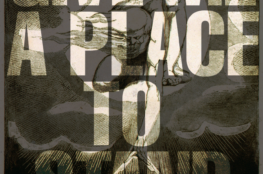In the following series of articles on the relationship between ethics and satire, I touch on the nature of laws and ethics, often using these terms interchangeably. While ethics and laws are not the same, they both fall under the category of human behavior. Ethics poses the philosophical question “How should one behave?”, while laws are the answers proposed to this question backed up by force. Thus one is the theoretical, the other the practical aspect of the same problem. It’s unimaginable, for example, for a legislator to create a law that he deemed unethical, while actions that are deemed unethical soon come under the purview of the law.–Hratch Demiurge
***
Herodotus says that our neighbors to the east, the ancient Persians, educated their boys from the earliest age to do three and only three things: “to ride [horses], use the bow, and to speak the truth” (1.136, de Selincourt page 98). A corollary to this last and most important injunction was never to borrow money because “a man who owes money is bound also to tell lies.” (1.138, ibid.) The Persians must also have forbidden the lending of money as well since, as Plutarch says, lenders “lie more than debtors and cheat in their ledgers, when they write that they give so-and-so much to so-and-so, though they really give less; and the cause of their lie is avarice, not necessity or want, but insatiable greed” (“That We Ought Not to Borrow”, Chapter 5). In our times, which are so much more enlightened regarding finances, neither borrowing nor lending money is forbidden because, unlike the old Persians, we no longer ride horses, use the bow and arrow, or tell the truth.
Meanwhile the Romans, our neighbors to the west, had their school age youths memorize the famous Twelve Tables of the Roman Law, as its greatest orator and trial attorney Cicero recalls: “for we learned the Twelve Tables when schoolboys as an indispensable lesson” (On the Laws, Book 2, page 456). Written on twelve bronze tablets, these laws set out the rights and also the duties of every Roman citizen. One of its statues reads, “A person who has been found guilty of perjury shall be hurled down from the Tarpeian Rock.” According to historian Livy, they constituted “the source of all public and private jurisprudence” (Book 3.34). These laws were good enough to be used as the foundation for all law in the West until the present. Though Latin died as the language of other disciplines, it continues inseparable from law, such that when one enters a court of law, a man may be de jure American or French, but he becomes de facto Roman and speaks the language of Rome.
Our nation, on the other hand, stuck in the middle between these two, alternately under the hegemony of both, followed the example of neither in formulating and codifying its own ethical principles or law code. The only lesson taught to Armenian children from generation to generation, whether explicitly given in the form of a maxim or silently modelled by the behavior of parents and elders, has been this and this alone: “ ‘No matter whence the money comes, but money you must have.’ These are the lessons taught by skinny old nurses to little boys before they can walk; this is what every girl learns before her ABC!” (Juvenal, Satire XIV, page 279)
A third nation was to prove more influential on Armenia than either Rome or Persia, and that was Judaea, for Armenia would be the first to adopt an upstart Jewish sect as its official state religion, Christianity. But as significant as Christianity has been on Armenian history and culture, it never imparted Armenia with a worldview or any accompanying set of ethics or laws. This may sound surprising, but there are two reasons for this.
First, the ethical teaching of Christianity was never important to Armenians in itself. From the beginning, Christianity served merely as a means of defending our Armenianness. This is well known even to scholars of Christianity in Armenia, one of whom writes, “The Armenians were not the defenders of Christendom at large holding back the heathen at the eastern border. They were defending their ancestral way of life and their individual traditions” (Thomson, 24). A recent example illustrating this undeniable fact came on the occasion of the last war with the Iranians who call themselves Turks, that is, the Azerbaijanis. An Armenian priest, who became famous for a picture in which he posed with a cross in one hand and an AK-47 in the other, angered a small number of Armenians who consider themselves Christian before being Armenian, when he suggested that he would rather save Armenia than save his soul and that it was more important to live as Armenian than die Christian. Or, in the words of one of Baronian’s big shots, Archbishop Khoren Kalfayan:
Let the same earth receive that cradled us;
Armenians we, when life to us was given;
Armenians let us live, Armenians die,
Armenians enter heaven! (translated by Alice Blackwell)
Secondly, and more importantly, even if Armenians were earnest about Christian doctrines in themselves, the New Testament, unlike the Old Testament, has no laws. No dietary laws, no financial laws, no constitutional laws, nothing. On the contrary, its precepts frequently discourage judging and preaches loving forgiveness for those who’ve broken the law. It’s this that allowed Jesus to plausibly say “Render to Caesar the things that are Caesar’s, and to God the things that are God’s” because he offered no laws that would interfere with the secular law of the Romans. It’s this also that opened the door to the idea of “separation of church and state” in Christian countries in the West, something which is unthinkable in religions like Judaism, Islam, Hinduism, Confucianism, and Shintoism in which worldly law is intimately intertwined with the heavenly law.
Around the time of the publication of Pagan Songs, I was having a conversation about religion and Armenia with a colleague, and I noted that Christianity is neither Armenian nor suited to Armenians, but rather coming out of the soil of Judaea was suited to the inhabitants of that country. By way of an apology for Christianity, my colleague responded, quite correctly, that Jesus and his teachings in the New Testament were meant to relax the strict adherence to the letter of the law found in the Old Testament by the Pharisees. My response was, “Exactly! What does that have to do with us? We didn’t need to hear a message about love, forgiveness, and the spirit of the law…we never had any laws to relax!” Imagine adopting a creed that involves the loosening of the literal interpretation of the laws of the Old Testament by a people who never even adhered to those laws in the first place. It’s like someone taking a laxative when they already have diarrhea.
Therefore, the New Testament doesn’t count as a set of ethical rules or laws for Armenians. Not only are no laws to be found here, its overall message is antinomian. If anything, ancient Armenia needed an Old not a New Testament. In fact, the most admirable aspect of Judaism is not its conception of the divine or its reputed monotheism. Infinitely higher conceptions of divinity and oneness are given, for example, in the scriptures of the ancient Hindus, the Vedas. In this regard, Judaism isn’t much different from the “pagan” religions it resisted, denounced, and made war against. Heraclitus, who was not so obscure as people make him out, said, “The people must fight for its laws as for its walls,” and so to truly appreciate Judaism for its real versus its pretended glories, only look at how it has preserved its laws, which might be the most remarkable achievement in the history of the world. We admire Lycurgus and the Spartans for persisting for 500 years as the most powerful state in ancient Greece with the best laws, but how much more admirable is the preservation of the 613 total laws in the Pentateuch for 2500 years in widely varying climates and countries? Undoubtedly these laws have undergone alterations, countless sects have arisen rejecting part or all, but the staunch adherence to and preservation of them in their scriptures makes it a monument more impressive than anything erected in stone by the Egyptians or the Athenians.
References
Cicero, On the Laws. Translated by C.D. Yonge. H.G. Bohn, 1851.
Herodotus, The Histories. Translated by Aubrey de Selincourt, Penguin, 1954.
Juvenal, Satires. Translated by G.G. Ramsay. G.P. Putnam’s Sons, 1918.
Plutarch, Moralia. Translated by Harold North Fowler. Volume 10, Harvard University Press, 1936.




